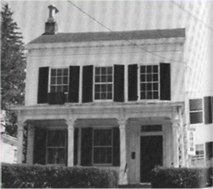The Princeton Years
Texts by Dr. Antonio Moreno González
Einstein and his entourage arrived in New York on 17 October 1933. Paul Langevin (1872-1946), lamenting the occasion, wrote: "The Pope of physics has moved house and America has become the world centre of the natural sciences".
He set up home at 112, Market Street in Princeton, near the Institute of Advanced Studies, founded with an endowment of five million dollars given by Louis Bamberger and his sister Mrs. Felix Fuld, wealthy Jewish financiers, to Abraham Flexner, a well-known reformer of the American educational system, to create an elite institution devoted to research and education. Despite several attempts to tempt Einstein back to Europe, Flexner finally managed to lure Einstein to the institute. Einstein suggested that he should receive an annual salary of three thousand dollars, but to his own surprise and Elsa's joy, it was set at $15,000 dollars and he was guaranteed retirement at 65 (he was then 54) with a pension of $7,500. The offer was unquestionably generous, especially given that he had no teaching duties, except to attend occasionally to small groups of students.
However, his stay in Princeton was not as fruitful as he, and the lecturers at the Institute and the university, would have liked. Philip Franck, who replaced Einstein at the university of Prague and became an expert on his life and work and one of his most reliable biographers, puts this disappointing outcome down to Einstein's "absolute independence from his surroundings". Einstein himself recognised how little sway he had at the institute when he wrote (12/4/1949) to Born, whom he had promised a long stay: "I suggested it, but I have little influence; they consider me to be petrified because over the years I have become deaf and blind (in a figurative sense). I do not mind much; it suits my temperament quite well".
His public fame, however, was on the increase; he was pursued by journalists and busybodies, graduates wanted to work with him and scientists from all over the world took advantage of--or deliberately organised--their time in Princeton to visit him. He was very popular in the leafy suburb he lived in; the shopkeeper who attended to his first purchase in town, an ice-cream and (surprise, surprise!) a comb. --remembered him fondly. He received so much correspondence that Helen Dukas was forced to screen it and in some cases to "cushion it" (soften it down) when the contents might not be to his liking. His telephone number was never listed and visits were carefully chosen.
Although he became an American citizen in 1940 and recognised noble qualities in the American people, he never felt American. He missed his life in Switzerland and eagerly received anyone who could take him back to that time and place. It is said that Einstein fell for his last love, Johanna Fantova, above all because she was central European.
In Princeton, although he continued in his failed attempts to unify gravity and electromagnetism, he inspired the successful scientific future of those who worked with him, continued fine-tuning his cosmological theories and contributed to clarifying the fundaments of quantum mechanics, while still refusing to accept the inevitable indeterminism. The most regrettable incident of his American years--albeit justified, he felt, by the Nazi menace--was the role he played in the American government's decision to manufacture the atom bomb, a contribution which was in sharp contrast to his ongoing anti-war campaign.
He died at 1:15 am on 18 April 1955. His last words, unintelligible to the nurse who was attending him, were in German, the language in he had always preferred to express himself in speech and in writing, although when necessary he could also speak fluent French and a rather quaint English. He left instructions--which were respected--that there should be no funeral; that his ashes should be scattered without saying where, and that no plaque should be erected on his house to say that he had lived there. Many years later, after Margot and Helen Dukas had died, the house was occupied by the physicist Frank Wilczek, who was later to win the Nobel prize (2004).

112 Mercet Street
